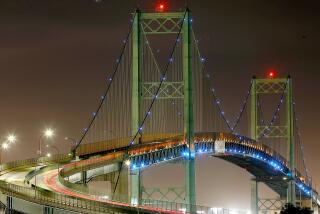Good Deal Would Benefit Everybody : Unclogging the famed Alameda corridor
- Share via
Last week Gov. Pete Wilson signed a bill giving Caltrans, the state transportation agency, the power to acquire through eminent domain 20 miles of railroad for creation of the Alameda Corridor, linking Southland ports with downtown Los Angeles. That was the right thing to do, but it represented one more sharp bend in the already twisted road toward agreement on this project. The line is vital to the region’s long-term economic health. Ironically, as all parties continue to affirm the necessity of the new corridor, its construction seems more remote than before. Success will require a good-faith effort by all parties, including the Southern Pacific Transportation Co., which owns the existing rail line.
The project would upgrade the rail corridor to allow three railroad companies to ship cargo to and from the ports. While the adjacent ports of Long Beach and Los Angeles efficiently handle more containers than any other port in the United States, the pace on land slows severely. Trains, which haul about half of the 2.2 million containers transferred onto or off of ships at those ports, travel as slow as 5 m.p.h. on tracks that crisscross busy streets, often tying up traffic. Many of the remaining containers move to and from the ports by truck along the Long Beach and Harbor freeways, already congested with commuter and other commercial traffic.
The proposed Alameda Corridor should ease congestion, eliminating the need for trucks and allowing trains to travel in open trenches at about 40 m.p.h.
There is strong support for the renovated corridor and the thousands of short-term and long-term jobs it will generate, but many financial and contractual obstacles remain. The most formidable has been Southern Pacific’s high asking price for its rail line and loading yards, as well as its projected loss of some of its port cargo hauling business to the Santa Fe and Union Pacific railroads.
In June, officials of the two ports agreed to purchase the right of way from Southern Pacific for $260 million. But recently they exercised their option to cancel that agreement, citing concerns about property title, potential environmental cleanup and the failure of the three companies to agree on how they would share the new line.
Gov. Wilson is not alone in wanting to keep the project on track. But condemnation through eminent domain is, at best, a long and complicated process and will not magically resolve the many side issues that have plagued this deal. The best way to keep this train moving down the track would be for all sides to return to the bargaining table.
More to Read
Sign up for Essential California
The most important California stories and recommendations in your inbox every morning.
You may occasionally receive promotional content from the Los Angeles Times.













